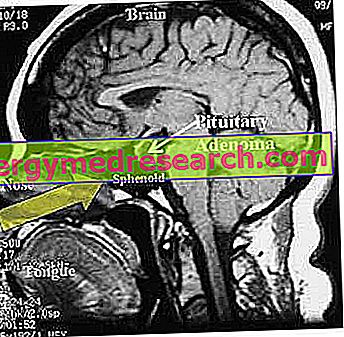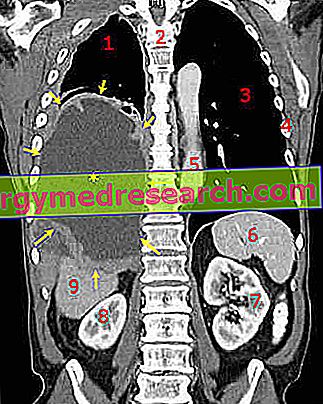Causes
In most cases, pituitary adenomas arise spontaneously, in the sense that they are not inherited. The hypothesis underlying the onset of the neoplasm, consists in the intervention of some growth factors, which can favor the appearance of mutations in cells already genetically predisposed.

Symptoms
The symptomatology obviously varies according to the type of adenoma. The clinical picture depends on the growth of the tumor mass, with local symptoms due to the compression of the neighboring structures, but also on the ability or not to induce an alteration of the pituitary function (hypopituitarism, hormonal hypersecretion or hypersecretive syndrome). In many cases, pituitary adenomas are asymptomatic and the patient does not suspect their existence, so much so that they are often diagnosed accidentally.
Pituitary adenomas can produce different symptoms, depending on several factors:
- Pituitary hyperfunction: an active hormone is released in excessive amounts in the blood. Usually, patients have symptoms related to the action of the hormone, with alteration of the delicate hormonal balance that regulates the functions of our body. This effect is typically produced by functioning adenomas.
- Pituitary hypofunction : may be due to the compression of pituitary structures adjacent to the tumor mass (mass effect).
- Neurological signs (mass effect) : non-functioning adenomas can remain silent, until they cause problems typically related to the size of the neoplastic mass. If they grow to an important degree, macroadenomas can compress the pituitary gland and the structures that are located near the tumor. This effect can produce neurological disorders, impairment of the visual field (if it compresses the optic chiasm, the intersection of the optic nerves, can even induce vision loss) or it can compress the pituitary gland and cause pituitary insufficiency. Even functioning adenomas can grow and reach large dimensions, causing compression problems in addition to hormonal effects.
Symptoms associated with hormone overproduction
Adenomas that produce hormones determine characteristic clinical pictures.
- Pituitary adenoma secreting prolactin (prolactinoma). It determines an increase in prolactin levels in the circulation, causing an alteration of normal levels of sex hormones (estrogen in women and testosterone in men). In women, prolactinoma can cause irregularity or loss of the menstrual cycle and abnormal production of milk (galactorrhoea). In men, elevated prolactin levels can lower testosterone levels and cause male hypogonadism, associated with erectile dysfunction, infertility and loss of sexual desire. Other signs and symptoms of prolactinoma may include: headache, visual disturbances, fatigue and weight gain. See: hyperprolactinemia
- Pituitary adenoma secreting GH. Excessive production of growth hormone (GH) causes acromegaly in adults (growth of skull bones, hands and feet, joint pain, changes in appearance due to facial bone growth) or gigantism in children (fast growth, higher height compared to the norm and joint pains).
- Pituitary adenoma secreting ACTH . The ACTH hormone targets the adrenal glands, which produce glucocorticoids in response. The overproduction of the hormone and the consequent excess of glucocorticoids affect the whole organism. The pituitary ACTH secreting adenoma can cause Cushing's syndrome and a symptomatology that includes: hyperglycemia due to excessive secretion of cortisol (can induce diabetes mellitus), increased volume of the abdomen, deep vascularized stretch marks due to connective disintegration, and production of androgens by the adrenal gland in women (masculinization). The ACTH secreting pituitary adenoma can also manifest itself with symptoms such as increased body hair, facial swelling, depression and hypertension.
- Pituitary adenoma secreting TSH . Excessive production of TSH hormone acts on the thyroid gland, causing hyperthyroidism . These tumors are very rare and for this reason they are often confused with certain thyroid diseases. The secreting TSH pituitary adenoma presents with symptoms that depend on the overproduction of thyroid hormones: tremors, rapid heart rate, weight loss, increased appetite, difficulty taking sleep and anxiety.
Symptoms related to the mass effect (macroadenoma)
There are local symptoms due to the compression exerted by the macroadenoma on adjacent structures. In most cases, headache (continuous and resistant to analgesics) and visual symptoms appear, due to compression of the optic pathways. Vision disorders, in particular the loss of peripheral vision, occur when macroadenomas grow upward in the brain cavity, compressing the optic chiasm, while blurred vision (loss of visual acuity) is felt if the macroadenoma grows forward and compresses the optic nerve.
In the presence of very large adenomas can also appear:
- Drowsiness, weakness, dizziness and disorientation;
- Nausea, vomiting and unintentional weight loss;
- Loss of pituitary function and hypothalamic dysfunction;
- Rinoliquorrea (infiltration and loss of CSF from the nose);
- Paralysis of the cranial nerves (due to lateral extension of the tumor);
- Obstructive hydrocephalus;
- Temporal epilepsy (rare);
- Pituitary apoplexy (hemorrhagic infarction).
Symptoms related to pituitary hypofunction
When the tumor mass compresses the cells of the pituitary gland it can progressively induce pituitary insufficiency ( hypopituitarism ).
The clinical picture depends on which hormone is involved.
| Hormonal deficiency | Main effects |
Reduction of sex hormones, luteinizing hormone (LH) and follicle stimulating hormone (FSH) | In men: it can lead to a low level of testosterone, causing impotence and decreased sexual desire. In women: it can lead to infertility (ovarian failure). |
Reduction of TSH production | Hypothyroidism. |
Reduction of ACTH production | Reduced cortisol production and adrenal insufficiency. Symptoms include fatigue, low blood pressure, abnormal electrolyte balance. |
Reduction of growth hormone (GH) production | In children, the result is growth retardation. In adults, the effects may be subtle, but may include generalized fatigue, loss of tone and muscle mass. |
Reduction of prolactin production | Rare; occurs with severe pituitary insufficiency. |



